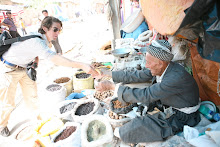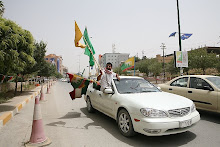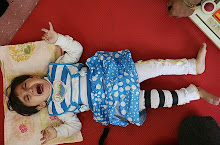Thursday, 14 April 2011
A few thoughts
Ajdabiya
For the lasts few days the city of Ajdabiya has been the front line in the war between Ghadaffi troops and rebel forces. It is the last city before the rebel stronghold of Benghazi and therefore hugely symbolic in this battle.
We had been trying to enter for a couple of days, but were being kept behind a rebel checkpoint near the eastern gate. While sheltering in a bombed out mosque we watched fighters return from the front, drained and exhausted. The next batch was always ready to go however and so a constant flow of men continued the fight.
With growing impatience we waited, never allowed more than a few streets inside before being rushed back amid gunfire. For two days heavy bombardment and sniper fire could be heard constantly, and as smoke billowed from the city we watched rockets streak across the sky. Nobody knew exactly what was going on but from the sounds alone it was clear that a battle was raging.
Finally following much persuasion we were allowed forward. There had been an apparent lull in the fighting and we had told the commander how we needed to see the hospital. One thing they have learnt very quickly is how important the media are and so we were given an escort and allowed to creep slowly forward.
Ajdabiya is normally a bustling city of about 170,000 but has since become a ghost town. The silence as we entered was eerie, interrupted only occasionally by bursts of gunfire and birds singing. Cars had been left abandoned in the streets, most of them burnt out. Make shift roadblocks had been put up on almost every intersection – though these had long since been abandoned. Countless buildings were gutted by fire and due to the shelling many had been reduced to rubble. Apartment blocks, shops, Mosques and offices had all been hit and it was clear that Ghadaffi’s troops were being indiscriminate in their shelling.
As we neared the centre of town, we could see rebel troops hiding in doorways. Many signalled for us to go back. We made it to the hospital however without any incidents and were allowed in. Most of the wounded that day had already been evacuated to Benghazi but some still remained, and the morgue was full. The wounded were either gun shot or shrapnel victims and many were in pain. It was an awful sight to see, and standing amid pools of their blood while trying to talk them, I felt suddenly guilty. Surely they deserved a little more respect, but as I moved to leave the room one called me back and almost unable to talk wanted to tell me what a monster Ghadaffi was.
Most of the doctors in Libya came from abroad; Egypt or the Emirates, and all of them have all now fled. There are therefore only a few left and many nurses now do the jobs of surgeons. We recognised a doctor we had met on the front line some days earlier and on that occasion he had just lost a fellow doctor in a NATO friendly fire accident. He appeared to have had no sleep since but was still running the surgery.
Leaving the hospital we decided to go further in. Ghadaffi’s artillery could reach to about the city centre and we wanted to see the level of devastation. Rumours of bodies lying in the road up ahead had also reached us at the hospital, and we wanted to verify this. Apparently their hands had been bound and their necks cut.
Ghadaffi’s tactics have been to bombard the centre then send in fast moving teams of pick up trucks - about 40 people total, to try and capture ground. These roving war parties are liable to come from any side and so it is easy to get cut off from the rebels – this is how many of them have been caught. These troops loyal to the regime are made up almost exclusively of foreign mercenaries and later in the day I was shown the photocopied passports of 44 men from Tunisia, Mauritania and Chad. We were told that these passports had been taken off dead bodies, but there is no way of verifying this.
Finally we reached the spot where the bodies had been found. They had since been moved, but judging by the blood on the ground, it was clear that 5 bodies had once lain there. A rebel commander pulled us to one side and on his phone showed us the bodies as they had been found. They were indeed bound and the necks slit open. Yet again if became clear that Ghadaffi will take no prisoners.
Just a few minutes later, while walking down a nearby street, gunfire and shelling erupted again and just over our heads a shell whistling by. We were thrown into a car and made our escape as Ghadaffi forces made another attempt to push in.














































